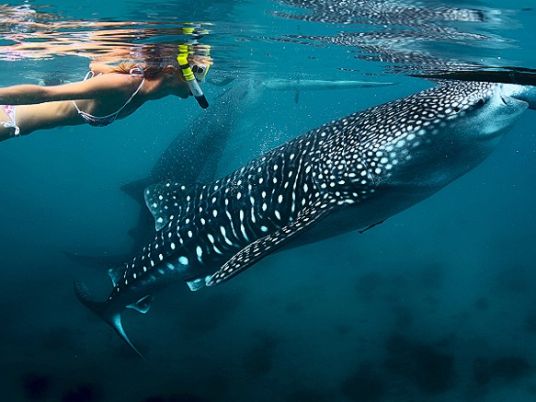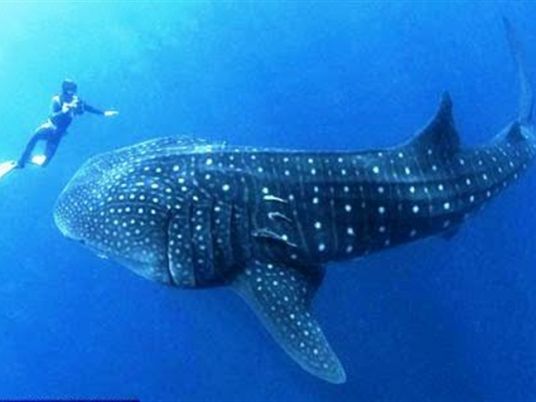
Red Sea Reserve officials have intensified efforts to identify a diver from a diving center in the Red Sea for harassing a whale shark while recording a video, frightening the rare animal and causing it to flee.
The officials warned against any practice that would harm the marine environment, and stressed no complacency in applying penalties on violators, which amounts to a three-month suspension on the boat used to commit the violation and a fine of LE50,000.
Officials from the Rescue and Environmental Protection Society have appealed to authorities, launched awareness campaigns to protect the whale shark known locally as the “Bahloul” and maintain its presence in Hurghada waters, after receiving several reports that Egyptian and foreign divers have harassed the peaceful fish.
The President of the Society, Hassan al-Tayyeb, recommended observing the whale shark from a safe distance and not to touch, chase or disturb it with the camera’s flash. He also demanded applying the natural reserves law against violators, pointing out that the whale shark appearing in the Red Sea showcases the rich variety of the Red Sea’s marine environment.
Whale sharks have appeared several times in three different areas across the Red Sea, including Port Ghalleb, the al-Fanous area, and between the two islands of Giftun, Red Sea Reserves manager Ahmed Ghallab said in an earlier statement.
It was last monitored in November 2018.
Marine biologists consider the appearance of the animal a rare event, which demonstrates the success of protection efforts for the Red Sea’s environment, along with Egypt’s commitment to international agreements in this regard, leading to the settlement of the whale shark in the Red Sea.
Whale sharks have no teeth, filtering in the water to feed. They owe its name to its gargantuan size, with the largest adults reaching up to 13 meters in length, making them among the largest species of fish. As they primarily feed on plankton, they pose no danger to humans.
It weighs up to 21.5 tonnes and is the only type of Rhincodon genus belonging to the Rhincodontidae family (formerly called Rhinodontes before 1984).
Whale sharks are found in tropical and warm oceans and live in the open seas. It can reach 70 years old and emerged about 60 million years ago.
Hunting whale sharks is banned in Egypt as the species is endangered, and concentrated efforts have been made to preserve the Red Sea ecosystem, home to several other rare and endangered species.
Edited translation from Al-Masry Al-Youm




